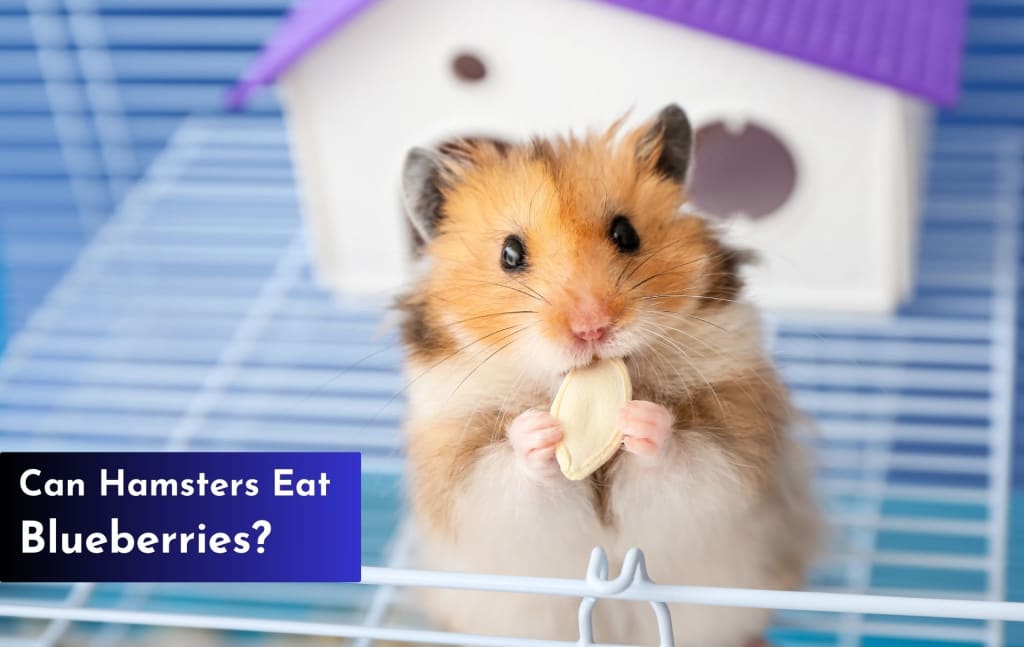Can Hamsters Eat Blueberries?
Unraveling the Nutritional Benefits

Imagine a world where hamsters don tiny chef hats and gather around a miniature dining table, ready to indulge in the finest culinary delights. One question looms in this whimsical hamster gastronomy: Can these furry, food-loving creatures partake in the delightfully plump, indigo-hued orbs known as blueberries? Welcome to the delightful realm of "Can Hamsters Eat Blueberries? Unraveling the Nutritional Benefits of Blueberries."
In this article, we embark on a culinary journey through the world of hamsters and blueberries, uncovering not just the answer to whether these tiny wonders can savor the fruity goodness but also the nutritious treasures hidden within those little blue globes. So, fasten your miniature seatbelts and prepare for a delectable adventure into the heart of hamster nutrition!
Can Hamsters Eat Blueberries?
Yes, hamsters can safely consume blueberries in moderation. These small, nutrient-dense berries offer a range of health benefits for hamsters when integrated into their diet appropriately. However, like any food, blueberries should be given in moderation and as part of a well-rounded diet.
Nutritional Benefits of Blueberries for Hamsters
Blueberries are packed with essential nutrients that can contribute positively to a hamster's well-being. Here are some of the vital nutritional benefits:
Antioxidants: Guardian Angels for Hamster Health
In the world of hamster nutrition, antioxidants emerge as the unsung heroes. Blueberries are teeming with these potent compounds, particularly flavonoids, which act as the guardians of your furry friend's well-being. These potent antioxidants swoop in, neutralizing harmful free radicals that can wreak havoc on cells and tissues. By doing so, they fortify your hamster's immune system, offering a shield against potential health threats. So, with every nibble of a blueberry, your hamster gains a dose of natural armor, standing strong in the face of oxidative stress.
Also Read: Is F3 Savannah Cat the Right Pet for You?
A Bounty of Vitamins and Minerals: Nature's Multivitamin
Within the petite confines of a blueberry lies a treasure trove of essential vitamins and minerals. Vitamin C, often celebrated for its immune-boosting prowess, graces these tiny orbs, providing your hamster with a potent dose of defense against illnesses. Meanwhile, vitamin K lends a helping hand in blood clotting and bone health, ensuring your hamster's vitality from nose to tail. Manganese, another star player, supports a range of bodily functions, including metabolism and bone development. Together, these vitamins and minerals compose nature's multivitamin, nurturing your hamster's overall well-being with each delightful blueberry morsel.
Fiber: Nature's Broomstick for Hamster Digestion
In the intricate dance of digestion, fiber takes center stage, and blueberries join the ensemble as valuable performers. These plump little orbs boast a commendable fiber content, providing your hamster's digestive system with the broomstick to sweep away any potential hiccups. Fiber promotes regular bowel movements, effectively preventing constipation and ensuring a smooth, hassle-free digestive process. By incorporating blueberries into your hamster's diet, you're not just treating them to a tasty snack; you're gifting them a ticket to digestive harmony.
Hydration: Blueberries, Tiny Hydration Heroes
While water remains the ultimate elixir of life for any creature, blueberries offer a delightful and hydrating bonus. With their high water content, these petite globes serve as a supplementary source of hydration for your hamster. This is especially vital for these pint-sized pets, who are more susceptible to dehydration. Incorporating blueberries into their diet allows your hamster to stay quenched, ensuring they're always at their best.
How to Safely Introduce Blueberries to Your Hamster
Introducing blueberries to your hamster's diet requires a gentle and cautious approach. Here are the steps you should follow to ensure a safe and enjoyable experience for your furry friend:
If you're looking for more information on hamster nutrition, consider checking reputable sources like:
- American Society for the Prevention of Cruelty to Animals (ASPCA) - They often provide reliable information on pet care and nutrition.
- The Humane Society - This organization provides accurate and helpful information on caring for pets.
- Hamster Enthusiast Communities - Forums and communities where experienced hamster owners share their knowledge and experiences can be valuable sources of information. Just ensure the data is backed by evidence or experience.
FAQs
What fruits can hamsters not eat?
Hamsters should avoid citrus fruits like oranges and lemons, as they can be too acidic for their digestive system. Additionally, pits or seeds from fruits like apples and cherries should be removed, as they can be choking hazards.
Can hamsters eat blueberries and strawberries?
Yes, hamsters can eat blueberries and strawberries in moderation. These berries are rich in vitamins and antioxidants, providing health benefits when included in their diet.
What kind of berries can hamsters eat?
Hamsters can enjoy a variety of berries, including blueberries, strawberries, raspberries, and blackberries. These fruits are not only safe but also provide essential nutrients.
What fruit is healthy for hamsters?
Fruits like apples (without seeds), bananas, and pears (without seeds) are healthy options for hamsters. These fruits offer vitamins, minerals, and fiber, promoting a balanced diet.
What is toxic to hamsters?
Some foods toxic to hamsters include chocolate, caffeine, garlic, onions, and certain types of seeds (like apricots and cherry pits). Additionally, sugary and salty snacks should be avoided, as they can lead to health issues.
Wrap Up
In conclusion, when given in moderation, blueberries can be a nutritious addition to a hamster's diet. Packed with antioxidants, vitamins, and fiber, these tiny berries offer your furry friend a range of health benefits. However, it's crucial to exercise caution and consult with a veterinarian before introducing any new food into your hamster's diet.
Remember, every hamster is unique, and what works well for one may not be suitable for another. By providing a balanced diet that includes a variety of safe and appropriate foods, you can help ensure your hamster leads a happy and healthy life.
Incorporating blueberries into your hamster's diet can be a delightful way to enrich their nutritional intake, but always prioritize their overall dietary needs above all else. With thoughtful care and attention, your hamster can enjoy the occasional sweet treat while reaping the nutritional benefits of these tiny, flavorful berries.
Disclaimer: Some of the part of this post includes content written by AI.
About the Creator
Amir Hossain
I blog on everything and anything— hoping my blogs will make your days a bit happier!






Comments
There are no comments for this story
Be the first to respond and start the conversation.